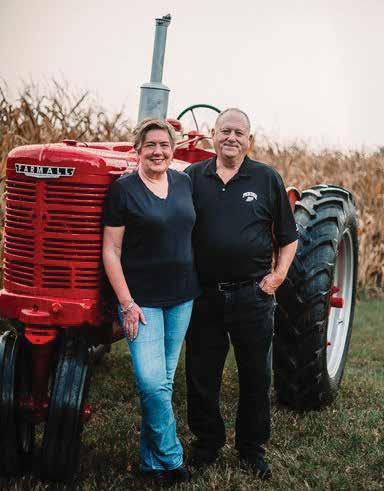
5 minute read
U.S. Soy Sustainability certificates increase value for global customers
from Indiana Corn & Soybean Post - Holiday 2022
by Indiana Soybean Alliance & Indiana Corn Marketing Council
BY MARY PECK
International customers of U.S. Soy can better demonstrate their commitment to sourcing sustainable ingredients now that the U.S. Soy Sustainability Assurance Protocol (SSAP) allows the transfer of SSAP certificates up to four times.
U.S. Soy customers have long sought more transparency in the sustainability of their purchases. This recent change to the SSAP by Soy Export Sustainability, LLC, which is partially funded by the national soybean checkoff, allows customers to keep records of their sustainable U.S. Soy purchases, use these purchases to meet their ESG (Environmental, Social and Governance) goals, and report on their progress toward those goals. Importers will be able to receive a certificate in their name from an exporter, the importer will then be able to transfer certificates to their customers. The certificate has the potential to be transferred a total of four times after export.
“Ensuring sustainable sourcing of products is central to our commitment to responsible supply chains. We are glad to see continuous improvement of the SSAP certifications, as well as the transparent and credible methodologies in place for measuring sustainable performance,” said Dessislava Barzachka, EA Sustainability Execution Manager, Bunge. “Transferable certificates are key to our customers and our business to track and verify that the soy products we source are raised in a sustainable manner, leading to greater sustainability of the global food system.”
The SSAP, which was developed in 2013, is a verified aggregate approach, audited by third parties, that verifies sustainable soybean production on a national scale. The system is designed to maintain mass balance of verified sustainable soy at each transfer and industry processing calculations are also incorporated into the system. The organization issuing and tracking the certificates is Soy Export Sustainability, LLC.
While this change meets the buyers’ needs for demonstrating their commitment to sourcing sustainable soy in the shortterm, in the longterm the change could also help generate demand for their products because of consumer preferences for sustainable products.
Under the SSAP guidelines, U.S. soybean farmers continuously improve their sustainability performance, ensuring an even more sustainable product in the future. U.S. Soy is already recognized as having the lowest carbon footprint versus soy of other origins. In addition, the SSAP includes farm audits conducted by the USDA. SSAP recently earned Silver Level Equivalence when benchmarked with the Sustainable Agriculture Initiative Platform (SAI Platform)’s Farm Sustainability Assessment (FSA) 3.0. It is also positively benchmarked with the soy sourcing guidelines of the European Feed Manufacturers Federation (FEFAC) through the independent International Trade Centre (ITC) and is recognized by the Consumer Goods Forum’s Sustainable Soy Sourcing Guidelines and

the Global Seafood Alliance’s Best Aquaculture Practices.
“U.S. soybean farmers have a strong commitment to sustainability, so we are always exploring how we can support their efforts to verify the sustainability of their products. The SSAP does that, but now with transferable certificates, it allows for that verification to be passed along to their other customers,” said Abby Rinne, Director of Sustainability, U.S. Soybean Export Council.
USSEC is a founding member of Soy Export Sustainability, LLC focused on differentiating, elevating preference, and attaining market access for U.S. Soy.

Frequently Asked Questions
What is the U.S. Soy Sustainability Assurance Protocol?
The U.S. Soy Sustainability Assurance Protocol (SSAP) is a protocol that outlines the regulations, processes, and management practices that ensure sustainable soy production on the vast majority of U.S. soybean farms.
It is a national-based system of sustainability and conservation laws and regulations combined with careful implementation of best production practices on more than 300,000 U.S. soybean farms.
The SSAP aggregates how U.S. Soy farmers contribute to the improvement of environmental, social, and economic sustainability outcomes.
The SSAP’s quantifiable and results-driven approach was developed through a multi-stakeholder process –including participants across the entire value chain. It is regularly reviewed and updated.
What is an SSAP Shipment Certificate?
An SSAP shipment certificate provides verification to international customers that the soy grown in the United States is produced in a sustainable manner.
SSAP shipment certificates can be issued for any
type of U.S. Soy exported from the U.S, allowing for processing conversions into various types of soy including meal, oil, flour, and hulls.
What is an SSAP Transferable Certificate?
With SSAP transferable certificates, exporters of U.S. Soy can now transfer certificates to their international customers. And those international customers can transfer certificates as they sell SSAP verified soy through the value chain.
SSAP shipment certificates can be transferred to U.S. Soy customers four times after the point of export. The system will also allow for transferability based on processing conversions into various types of soy including meal, oil, flour and hulls.
What is the value of SSAP Transferable Certificates?
Exporters can improve the certificate transparency and record keeping of their own sustainability efforts, while enabling international customers of U.S. Soy to also demonstrate a verifiable commitment to sustainability. Customers can now benefit by receiving an SSAP certificate in their name for the exact amount and the exact product type of their global deliveries.










